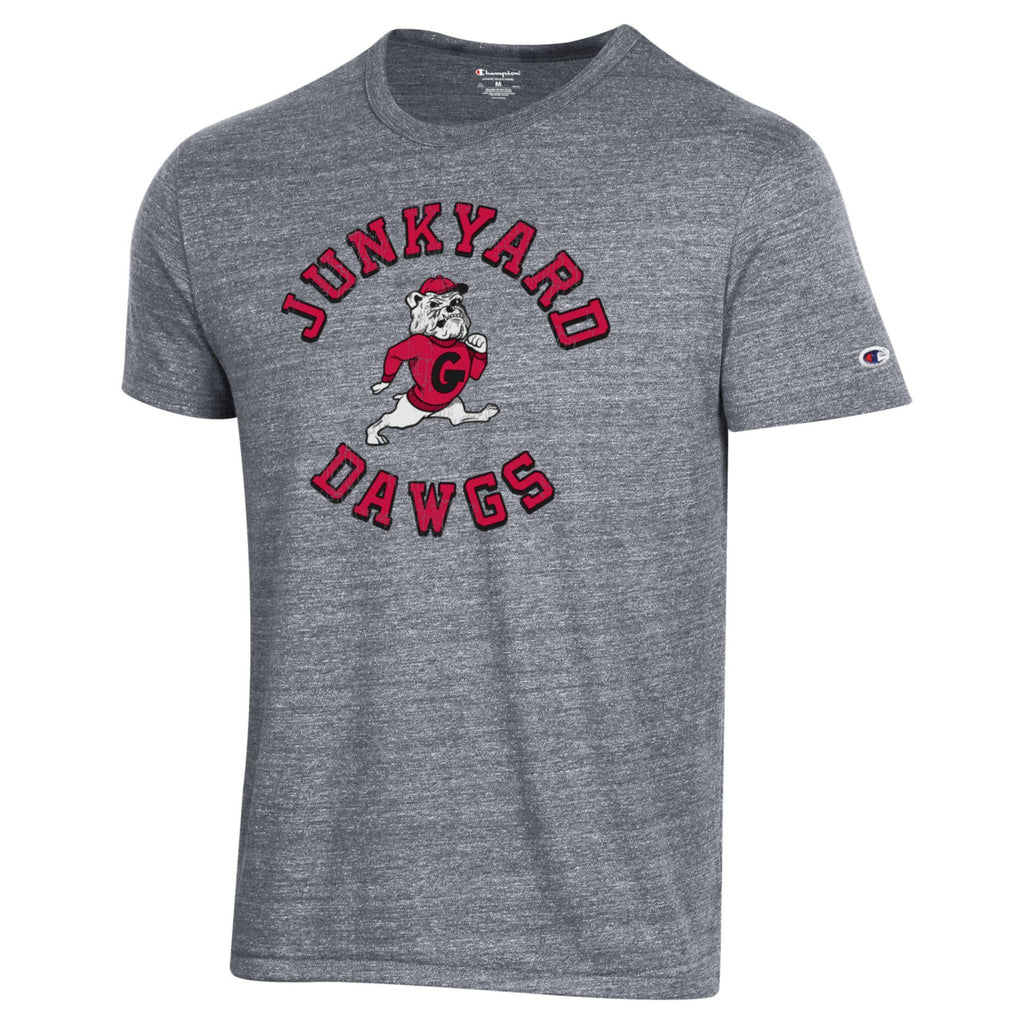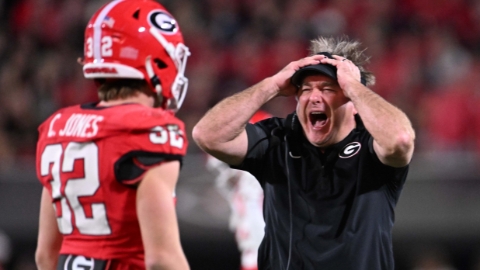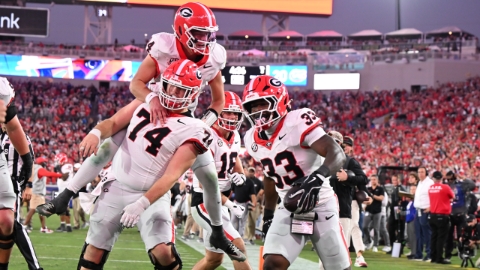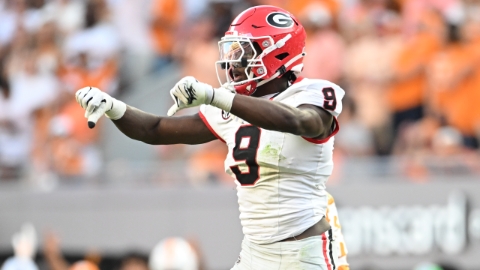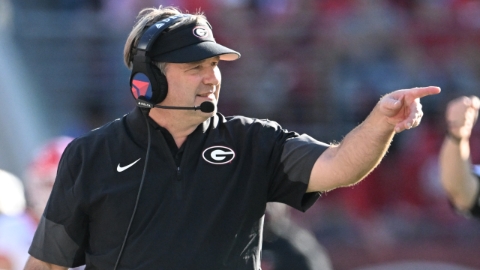UGA Football's Late Labor Day Night: The 1982 Night the Lights Went on in Georgia
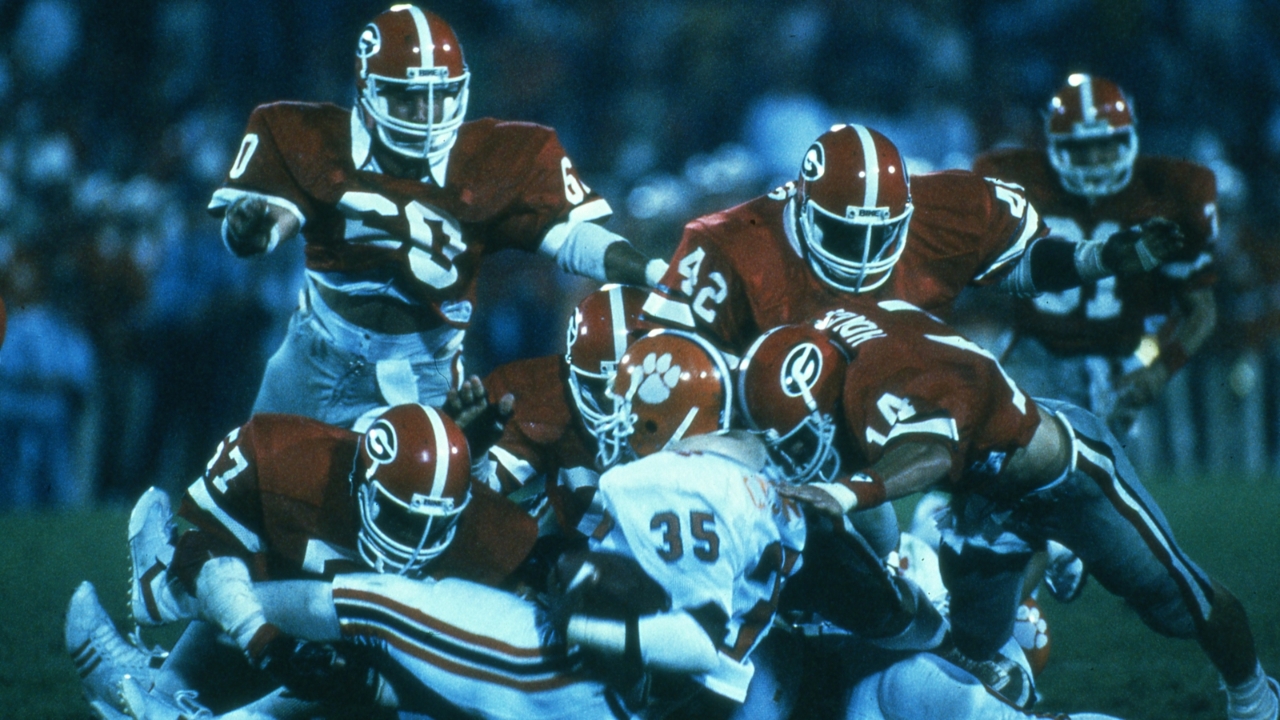
Real Georgia Fans Don’t Miss the Dawg Post Newsletter - Sign up now!
ATHENS - By the end of the first quarter of UGA Football’s 1982 fight with Clemson the two offenses had combined to complete two passes for negative eight yards.
It was not the sort of offensive production ABC wanted by putting the last two national champions on Labor Day Night, but it was exactly what Georgia-Clemson was during that series’ heyday in the early 1980s.
Tough, physical and dramatic, Georgia’s 1982 game with Clemson was featured the last two teams to win college football’s national title. Two schools separated by only 70 miles. It was culture vs. agriculture.
It was epic. Clemson lost the game 13-7, but it was the Tigers’ only loss of the year - and one of only two in a three-year period of time. Danny Ford’s program was placed on probation during the season for recruiting violations and were not able to play in a bowl game. Georgia’s only loss that year came in the Sugar Bowl against Penn State in a game that determined the national title that season.
LIMITED TIME: Get Dawg Post coverage for $1 until the Alabama game
Unlike so many UGA-Clemson games before this one was at night - something ABC made sure it could secure before moving the game to Labor Day.
The network had paid Georgia enough money for broadcasting rights to put UGA coach Vince Dooley within reach of buying permanent lights for Sanford Stadium - something the structure had not had since the 1950s.
By the time the game rolled around six sets of lights towered over Georgia’s famous hedges thanks to Dooley’s financial foresight.
“ABC was providing schools about $50,000 to bring temporary lights,” Dooley told ESPN. "They made that offer to us. I took the $50,000 and put it towards the $250,000 that it cost us to put in full-time lights."
The lights were very much needed. By the end of the first quarter it was nearly 10 PM on the east coast. It was another quirk for agreeing to be on ABC. The game wouldn’t just be at night - it would not kick until 9:15 PM.
JUNKYARD DAWGS TRI-BLEND T-SHIRT
“They had just big truck wheeled in with the lights just lifted up. It was a different feeling at Sanford Stadium. We never had lights before, and it was new,” Georgia QB John Lastinger said.
Clemson had taken a 7-0 lead after Athens native Homer Jordan scored on a six-yard run after Lastinger’s fumble had set up the Tigers at the UGA 11-yard line. The first quarter was a bunch of defense and one big UGA mistake.
Most of the first part of the game was a punting exhibition. Jim Broadway. Then Clemson’s Dale Hatcher. Broadway; then Hunter.
But 33 seconds into the second quarter the game changed… perhaps appropriately on a punt.
Backed up near the bridge end zone, Clemson had to boot the ball away to Georgia’s offense. Clemson’s defense was stout. Even if UGA got the ball near midfield there was no certainty the Bulldogs would do anything with it. The Dawgs had not done much all game at that point. Hatcher just needed to get the punt off.
After all, Georgia’s best player - perhaps the entire offense - was presumed to be out of the game with an injury. Herschel Walker was the best player college football had seen in decades. Walker had become every bit of the hype he was as a five-star recruit coming out of Johnson County, where he picked the Bulldogs over Clemson.
Still, Hershel had more screws in his hand that night than UGA had first downs in the first quarter. If Georgia was going to get going it would need someone other than Walker to make that happen.
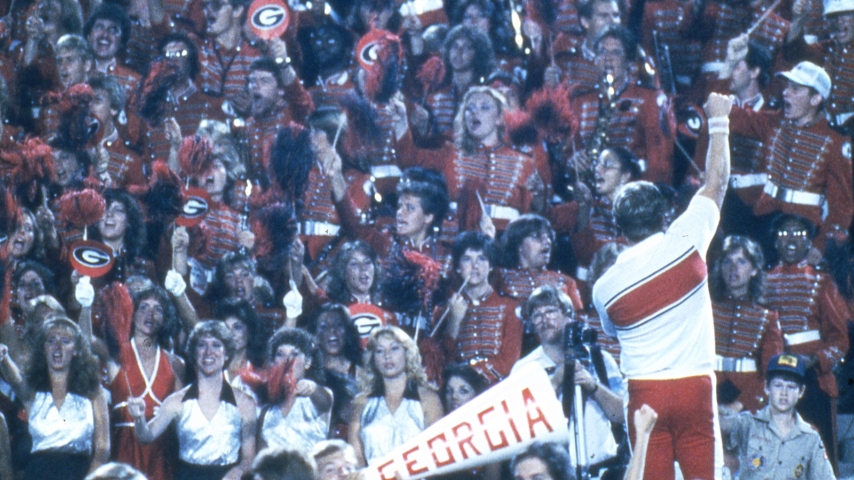
Instead of Walker, it was two virtually unknown players - Georgia’s Dale Carver and Stan Dooley - who scored the only touchdown for the Bulldogs.
As Hatcher gathered the ball to punt it, Carver rushed towards him - blocking the ball and sending it high into the night in Sanford Stadium. Dooley and Clemson’s Cliff Austin both fought for position to grab the blocked punt - so much so that the ball bounced on the ground before Dooley grabbed it at the Clemson two-yard line.
Austin, who had gone to Avondale High in DeKalb County, grabbed Dooley and tried to pull the ball from him. Hatcher did his part to stop Dooley’s progress, too, but a pile of UGA players hammered Dooley into the end zone for the score.
"They blocked the kick! It is bouncing around in the air, and Georgia's got it,” Larry Munson proclaimed. “Touchdown! Touchdown! 82,000 sway here and rock, and maybe a few million more around the country."
Sanford Stadium erupted. The game was tied.
“It was a huge relief,” Lastinger said of the swing in momentum. “The punt block - they let me off the hook. I felt like I had given them their first touchdown.”
“NO ONE COULD HEAR ME CALL THE PLAY”
For weeks the speculation about Walker’s hand injury captivated fans. Walker’s thumb was broken during late-August scrimmage weeks before the Labor Day clash with Clemson.
Walker was told the injury would keep him out UGA’s first two games of the season, but he told United Press International that he would be ready for the game.
“I think I'm going to be ready to return quicker than some people think,” Walker said at the time. “If they decide next Friday or Saturday I can’t play, I won't dress out for the game. I won’t even be at the stadium. I'll stay in the dorm and watch it on television.”
Vince Dooley told UPI that Georgia’s plan against the Tigers was sidetracked because of Walker’s injury.
“If he were available we'd give him the ball about 30 times,” Dooley told UPI. “Without him we'll use three backs and give each one the ball 10 times.”
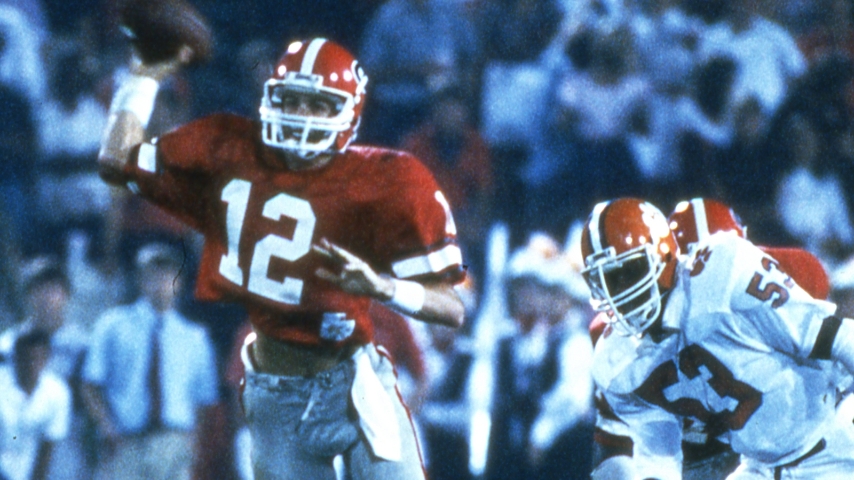
By the time the game rolled around Walker was not only at Sanford Stadium, but dressed out. Lastinger and the Dawgs had tried to be effective without Walker, and managed only two first downs. Walker’s injury was serious, and Dooley knew he wasn’t superhuman.
“I, like so many other people, had come to consider (Herschel) so indestructible that it was hard for me to realize that he was hurt as badly as he was, especially since he didn't seem to be bothered by the injury,” Dooley told UPI in August 1982.
Georgia missed Walker, and Dooley knew it. Doctors had warned Dooley to use Walker sparingly in the game. After Carver made his second huge play of the game - an interception that set UGA up at the Clemson 41 - it was time.
“Herschel had not been in the game, and we couldn't sustain - nothing was going on,” Lastinger said.
It was time to see what he could do - if anything.
“You could literally touch the screws,” UGA trainer Jody Tanner said of Walker’s status. “No one - he was not going to touch the ball.”
“I don't think it has really sunk in how much we might miss Herschel if he can't play against Clemson,” Dooley said. “But when we're third and one and have to punt, or have a fourth down on the one yard line and don't score, then the realization will set in.”
It was time to see what Walker could do.
Lastinger and the Georgia offense ran onto the field… and Walker ran out there with them. Pandemonium ensued - raining down hopeful cheers from the Georgia faithful - and perhaps fright from the Clemson fans cluttered on the west side of the stadium.
Herschel Walker, college football phenomenon, was going to play.
The noise was something else, and the play clock was running. Lastinger gathered those in Silver Britches around him to give them the play. Walker had been sent in by Dooley to try to catch Clemson off guard.
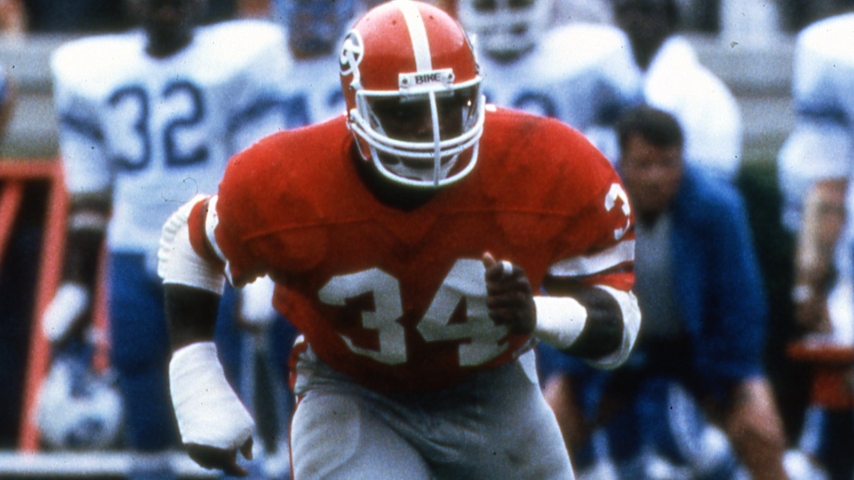
Lastinger and the rest of the offense were not certain if Walker would play.
“I thought Herschel playing depended on how the game went. I just didn't know,” he remembered.
“We thought it was a good idea to dress Herschel,” Tanner remembered “We knew we had the decoy play.”
The problem was it was so loud that no one could hear Lastinger call the play.
“Herschel Walker is in,” Larry Munson said on the radio call. “Lastinger is begging them to be quiet.”
“It was pretty crazy when we put him into the game. That place was rocking. No one could hear me call the play,” Lastinger said. “I had to scream it into their ears.”
The plan was to take all of the momentum that was Walker coming into the game and use it against Clemson.
It worked.
“It sure seemed like Clemson thought he was going to get the ball,” Lastinger said. “It was a great play call.”
Walker dotted the I for the Dawgs, and as Lastinger faked a fullback dive he rolled to his left with Herschel. Just then Tron Jackson ran to his right - between Walker and Lastinger - the other way. After securing a tight pitch Jackson’s speed and Herschel’s appearance wrong footed nearly the entire Clemson defense.
After dodging Clemson’s Tim Childers, Jackson was off to the races - flying into the end zone as the Sanford Stadium crowd went full delirious.
“There’s a flag!” ABC’s Frank Broyles said to his partner Keith Jackson.
Holding was called against Georgia at the 33-yard line.
“That was probably the biggest disappointment that day,” Tanner said.
A few plays later Kevin Butler’s 59-yard field goal attempt came up just short. Butler was fighting through a tough pre-game warmup that left him aggravated.
“I would hold the ball during warm ups for Kevin in those days,” Tanner remembered. “Kevin had this ritual where he would kick and warm up, and before the game he and I would go into the locker room before everyone and change his socks, get new bubble gum and put his shoes back one. But that game he was so disgusted with himself warming up that he quit early and went back into the locker room. It was probably the worst warm up of any game I saw Kevin play at Georgia, but if it had not been for his toe we would not have won that game.”
THE SCOUTING REPORT
The two teams knew one another well. Clemson’s roster had nearly as many players from Georgia (19) as it did from South Carolina (23). The year before Georgia’s nine-turnover catastrophe at Memorial Stadium paved the way for the Tigers to upset the Dawgs (-4), and go on to win the program’s first-ever national title. That year the Tigers were quarterbacked by Athens native Homer Jordan.
"I remember playing in a high school all-star game and it seemed like there were four or five guy going to Clemson,” Lastinger said. “You knew everybody. Homer Jordan - he spent more time in McWhorter Hall than guys that went to Georgia. He knew a lot of guys. Amp Arnold was his best buddy. I bet would would see him about once a week.”
Jordan ended the 1981 game going 11 of 18 for 131 yards, and ran it 25 times for 59 yards.
“Mike Cavan was going over the scouting report and he said: ‘Hell, I don't need to tell you who it is - y'all know him better than his teammates,’” Lastinger remembered.
The Dawgs knew they had to slow Jordan down if they wanted to win.
But it was massive No. 66, William Perry from Aiken, who was the real problem for Georgia. “The Refrigerator” was 6-3, 310 pounds, massive for early 1980s football. Perry was the only Tiger that tipped the scales over 300 pounds. He had given UGA fits the year before, and dealing with him was going to be a problem for Georgia’s offensive line.
“We knew he was talented,” Tanner said of the defensive lineman. “We watched what he did the year before to us.”
Perry gave Georgia fits all afternoon long in 1981. That wouldn’t work for UGA in 1982 - particularly with Herschel’s situation. And if Georgia needed any reminder of how athletic Perry was he gave it to them the day before the Labor Day fight. That Sunday Danny Ford’s Tigers took the field Between the Hedges. And before the Tigers left the field, Perry leapt in the end zone and slam dunked a football over the goal post before Clemson left the field.
“He didn't touch the goal post - he just slammed the ball over the goal post,” Tanner said. “It was incredible seeing a guy that big get off the ground like that.”
It was a reminder of what Perry could do - and what UGA was going to have to deal with on Monday.
“There were not too many like him - maybe reggie White at Tennessee,” Lastinger said. “Refrigerator would just throw you to the side and live in the backfield.”
“NO ONE THINKS YOU CAN GET THIS DONE”
Vince Dooley was a huge history buff. A former Marine, Dooley leaned on history to motive his players when it was needed. And the combination Herschel’s status and the rematch with Clemson meant it was time for Dooley to motivate his troops.
Dooley opened up his speech talking about the grind that it would take to beat the defending national champs.
“Someone had to drive in and get a foothold,” Dooley said of what he would correctly describe as the looming land battle Between the Hedges.
“That Clemson game was one of his big Iwa Jima talks,” Tanner said of the pre-game speech. “He knew what needed to be said at the right time because he knew his players. He was focused before the Clemson game - very, very focused. I wouldn't say stressed. He was zeroed in. He expected people to know what he was thinking. He handed me a cup, and I threw it away. He told me: ‘I wanted a damned Coke!’”
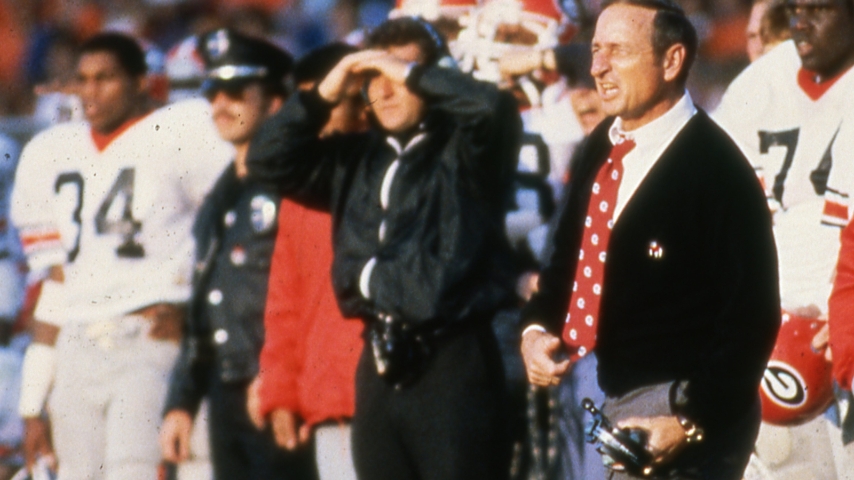
"No one thinks you can get this done, but you have to get it done,” Dooley told his team before they hit the field with the Redcoats blaring “Glory, Glory.”
Getting to the game itself was likely a relief for Dooley and his staff. Herschel was hurt, but the game that he been in the works for months was finally there - the distractions were over… and there had been plenty of distractions.
“A Vince Dooley spring practice was pretty much a blood bath every day,” Lastinger said. “It was a big spring for me. People wondered if I could do the job. That was about the time Coach Dooley let us know that the Clemson game had been moved to Labor Day.”
Both schools had been set to meet three weeks into September, but the move to Labor Day meant a 9 PM kickoff… and the longest pre-game situation Dooley had ever seen.
“With the game being at 9 PM that made for a really long day,” Lastinger said.
What Lastinger and the rest of the Bulldogs had also become accustomed to was the star power that Herschel brought to the program - and the other things that brought, too. In the 1970s, UGA players all lived at McWhorter Hall - known as “The Mac”. On game days before Herschel arrived at UGA, families and friends of players would visit with the team before games.
But once Herschel arrived in Athens that all changed.
“It wasn't uncommon you could have someone open the door and want to have the picture taken with you,” Lastinger said of what was becoming a wild scene each home weekend at The Mac.
Dooley wouldn’t allow that before the Clemson game. Things had gotten out of hand, and Georgia would be long gone from there most of Labor Day 1982.
“I think we went to two movies,” Lastinger remembered. “Coach Dooley was not going to let us sit around the dorms.”
With two movies down, and a national TV audience waiting, Georgia traveled to Sanford Stadium for the season opener. Clemson was coming into 1982 ranked No. 11. The Dawgs were No. 7.
A GOOD OLD-FASHIONED BATTLE
Kevin Butler’s most-famous kick against Clemson came in 1984. But the Stone Mountain native’s performance in 1982 saved the day for the Dawgs. Just before the half, Georgia tuned an interception into a late-half opportunity.
Butler knocked in a 39-yard field goal to give the Dawgs a 10-7 lead. His 23-yarder early in the third gave Georgia the narrow margin it needed to win the game at 13-7.
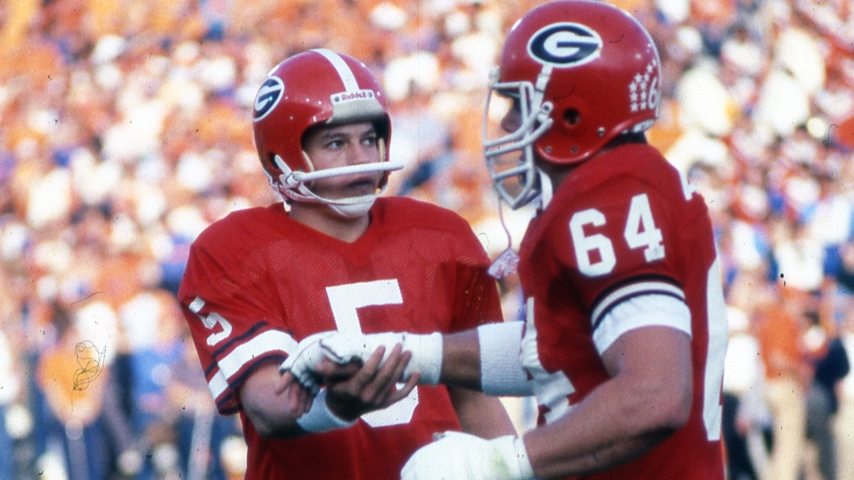
The game ended with only 490 yards of total offense. UGA had nearly as many punts (8) as first downs (10). Herschel had only 11 carries for 20 yards - ten of which came on one run. The game was the epitome of a defensive struggle, and indicative of the fight between the two schools in that time.
“It was a bitter rivalry,” Lastinger said. “The landscape was different back then. You didn't think of it in terms of if you lose you can't win the national championship. I think Coach Dooley probably knew how important it was to recruiting. Coach just loved a good old-fashioned battle. And that's what it was when you played them. There wasn't a lot trickery in that game.”
Well… maybe just one failed trick.
Georgia had survived Clemson. By the time the game ended - at 12:18 am Tuesday morning - the Dawgs had four days to get ready for BYU, and their quarterback named Steve Young.
“It made that BYU game much harder,” Lastinger said.
